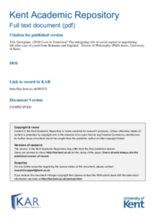Abstract
Most young people today can enjoy an extended stay under parental care unlike young adults who age out of residential, foster care or other alternative care systems ("care leavers"). Care leavers are expected to look after themselves in matters such as securing employment, and housing without necessarily being in possession of a durable supportive social network system. Increasingly, many significant worldwide studies concerning care leavers show the importance of relationship-based practice, and the pivotal role of networking to enhance interpersonal skills and emotional maturity. These ingredients are viewed to contribute to more positive outcomes at adulthood. However, relatively few studies have solely focused on the utilization of social capital and social networks to negotiate independent living. It is this gap that the present study addresses. The dearth of knowledge of the care leavers' own safety net and how they negotiate independent living has driven this research. Qualitative in approach, this empirical research used interviews and vignettes on a sample composed of 58 participants (31 care leavers from Romania and 17 from England ranging from 17 to 29 years of age together with five professionals from each country). Aimed at understanding strategies used to negotiate independent living through the lenses of social capital and social networks, this empirical study subsequently provides key indicators to improve leaving care policy and practice. According to young people's and professionals' testimonies, elements of social capital such as trust, encouragement, reciprocity, and access to information contributed to boosting levels of confidence that further lead to optimization of resources such as employment prospects. A close relationship between social networks/social capital and the participants' outcomes, including individual (enhanced resilience, positive identity formation) and attained socio-economic status has been identified here. This comparative study between Romania and England, chosen for their different welfare systems and wider social contexts, illustrates that social capital and social networks have acted as a main channel to socio-professional integration among the young adults. The findings suggest the essence of having established a strong foundation of support prior to leaving care. Nevertheless, as social capital is in its infancy in this domain, more empirical evidence is necessary to deepen an understanding of the concept's mitigating role in youth well-being and outcomes. This includes whether established capital prior to leaving care can contribute to positive experiences specifically during the early periods of transition. Another aspect to explore is whether fellow colleagues could represent an effective strategy in service provision during the preparatory stages to independence.

